
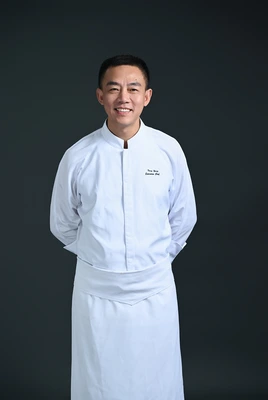
Interview with Tony Yang, Executive Chef, Waldorf Astoria Chengdu
专访 成都华尔道夫酒店 行政总厨 杨凯
1.What do you do at the Waldorf Astoria Chengdu?
I am the Executive Chef at Waldorf Astoria Chengdu.
1.你在成都华尔道夫酒店做什么?
我是成都华尔道夫酒店的行政总厨。
2. Tell us about your journey, how did it all start?
My culinary career began in 1987 after graduating from Chengdu Culinary School, where I honed my skills at iconic Sichuan restaurants like Rongle Garden and Long Chao Shou. I later worked at Chengdu Hotel, serving dignitary banquets, gradually rising to head chef. In the 1990s, I served as head chef at leading hotels like Dongtian Hotel and Yinhe Dynasty Hotel in Chengdu, blending tradition with modernity to lay a strong foundation. After 2000, I entered the international hotel industry, taking key roles at InterContinental Century City Chengdu and Grand Hyatt Chengdu, and joined Waldorf Astoria Chengdu in 2016, opening a new chapter.
2. 告诉我们你的旅程,是如何开始的?
我的烹饪生涯始于1987年,毕业于成都烹饪学校后,在蓉乐园和龙抄手等川菜老字号餐厅磨砺技艺。之后在成都酒店服务要人宴会,逐步成长为头厨。从90年代我在成都东天酒店、成都银河王朝酒店等当时的酒店翘楚担任头厨,融合传统与现代,奠定了基础。2000年后,我进入国际酒店行业,在成都洲际世纪城酒店、成都群光君悦酒店等担任要职,2016年加入成都华尔道夫酒店,开启了新的篇章。
3. What’s your philosophy on food?
My philosophy is “the natural flavor of ingredients, seasoned with Sichuan essence.” I continuously explore local ingredients, master the Sichuan 24 flavor profiles, and innovate constantly.
3. 你的饮食理念是什么?
我的理念是“食材本味,四川调味”。不断挖掘当地食材,掌握四川24味型的川菜技法,不断推新。
4. How might you describe the role of an executive chef?
The executive chef is the soul of the kitchen, responsible for menu creation, team leadership, and quality control. This role demands a combination of creativity, technical skill, management, and networking abilities.
4. 你如何形容行政总厨的角色?
行政总厨是厨房的灵魂,负责菜单创意、团队领导和质量把控。这需要思维、技术、管理、人脉等的多重能力。
5. Please walk us through a typical day at work. How do you prioritize your tasks?
Every morning, I check fresh market ingredients, plan menus, and oversee team preparation. During lunch and dinner peaks, I focus on service quality, while afternoons are for developing new dishes. Priorities are set based on ingredient freshness, customer needs, and team collaboration, with emergencies like seasoning shortages addressed immediately.
5. 请介绍一下你典型的一天工作。 如何确定你的任务优先顺序?
每天早晨我检查市场新鲜食材,制定菜单计划,监督团队准备。午餐和晚餐高峰期我关注服务质量,下午则研发新菜。优先级基于食材新鲜度、顾客需求和团队协作,紧急情况如调料短缺会立即处理。
6. What’s the most important aspect of being a good chef?
I believe the definition of an excellent chef lies in the ability to consistently create dishes that customers recognize and appreciate the capacity to continually innovate, and the establishment of a unique personal style. The most important aspect of becoming an excellent chef is a lasting passion for cooking; only through love can one refine the skills to achieve outstanding success.
6. 成为一名优秀厨师最重要的方面是什么?
我认为,优秀的厨师的定义是能持续做出令顾客认可的菜品、有不断推新的能力、有自己的风格定义。成为一名优秀厨师最重要的是对烹饪的长久热爱,唯有热爱才能磨练出优秀的成就。
7. Describe something that’s surprised you about working as a chef.
Something that surprised and amused me was when a foreign guest took an interest in my homemade source-DouBanJiang, planning to use it for stewing beef or spreading on bread back home.
7. 描述一下作为一名厨师让你感到惊讶的事情。
令我觉得惊讶又有趣的事,有一位外宾宾客对我的自制豆瓣酱感兴趣感,他会带回去炖牛肉或者涂抹面包。
8. When you hire new staff, what do you look for in them?
I value passion, teamwork, and an understanding of Sichuan cuisine. New hires must be willing to learn traditional techniques while adapting to the efficiency of a modern kitchen.
8. 当你雇用新员工时,你着重潜在员工的什么?
我看重热情、团队合作能力和对四川菜的理解。新员工需愿意学习传统技艺,同时适应现代厨房的高效运作。
9. How might you describe your management style?
My management style balances inspiration and guidance. I demonstrate seasoning and cooking techniques to encourage team innovation while maintaining strict quality standards.
9. 你的管理风格是怎样的?
我的管理风格是激励与指导并重。我通过示范自制调料和烹饪技巧,鼓励团队创新,同时保持严格的质量标准。
10. What are your biggest strengths?
I believe my greatest strength is being a Chengdu-born Sichuan chef who knows Chinese Sichuan cuisine best.
10. 你最大的优势是?
我想我最大的优势就是:我是来自成都的川菜主厨,我最了解中餐川菜。
11. How do you handle conflict in the kitchen?
In the bustling Chinese kitchen filled with fiery energy, conflicts are inevitable. As a communicative person, I respect my team’s ideas, listen, mediate, and encourage hands-on collaboration, turning conflicts into opportunities to enhance team harmony.
11. 你如何处理厨房里的冲突?
在烟火气十足的中厨厨房,厨房里的冲突是难免的。我本身是一位善于沟通的性格,会尊重团队的想法,倾听、调解和共同实践,冲突也是提升了团队默契的途径。
12. What’s your favorite part of being a chef?
Seeking ingredients and focusing on creation.
12. 作为一名厨师,你最喜欢的部分是什么?
寻找食材和专注创作。
13. And the not favorite part?
Against the clock. Especially during peaks when I must ensure both quality and efficiency. Sichuan cuisine involves complex cooking methods and processes, with every step essential, all to deliver the best experience to customers.
13. 不喜欢的部分是?
时间压力,尤其在高峰期需同时确保质量和效率,川菜的烹饪方式和工序较复杂,每个环节不可少,只想让顾客享用到最好的出品。
14. How do you stay up with the culinary trend?
To cook well, you must first understand eating. I often visit markets to seek fresh ingredients, act as a food enthusiast, explore street food across regions to learn various culinary ideas, and exchange insights with peers. This is also essential for adaptability and innovation.
14. 你如何让自己跟上烹饪潮流?
会做菜先懂吃。我常去市场探寻新鲜食材,当个美食家,吃遍大街小巷学习各地美食和理念,并与同行交流。这也是应变和创新所需。
15. What’s your favorite ingredient to work with?
Chengdu’s Erjingtiao chili. It’s the key ingredient in my seasoning.
15. 你最喜欢使用什么原料?
我最爱成都的二荆条辣椒,它是我调味的关键食材。
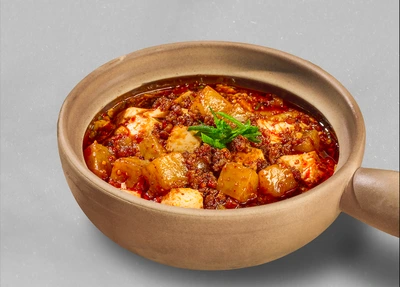
16. What’s your approach to local versus imported ingredients?
Local ingredients like fresh seasonings, mushrooms, and vegetables preserve Chengdu’s authentic flavors and are my first choice. Imported ingredients add diversity and ensure quality to the menu; I balance their use according to the season.
16. 你对本地原料与进口原料有何看法?
本地原料如新鲜调味、菌菇、蔬菜等保留了成都风味,是我的首选;进口原料则为菜单增添多样性和保证食材品质,我会根据季节平衡使用。
17. What’s your approach to sourcing locally-grown ingredients?
Sichuan’s good mountains and waters are a treasure trove of ingredients. From the black pigs of Daliang Mountain to the Ya fish of Ya’an, the native chickens of Jiange, the bamboo shoots of Mount Emei, and the tomatoes of Panzhihua, all serve as my sources of inspiration. I regularly visit local markets and farmers to ensure freshness and quality, incorporating them into the menu to showcase Sichuan’s diverse flavors.
17. 你采购本地原料的方法是什么?
四川好山好水是食材宝地。从大凉山的黑猪到雅安的雅鱼,剑阁的土鸡,峨眉山的竹笋,再到攀枝花的番茄,都是我的灵感来源。我定期走访当地市场和农户,确保新鲜度和品质,融入菜单中展现四川的多样风味。
18. What’s the most unusual ingredient you use in cooking?
There are many. Recently, at our Infinite Luck Chinese restaurant, we introduced a new dish: Emei Bamboo Shoots. The tender highland shoots from Mount Emei are paired with Ya’an caviar, creating a beautiful collision of mountain wildness and the freshness of river and sea.
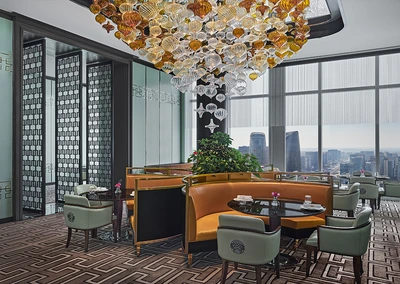
Waldorf Astoria Chengdu – Infinite Luck is one of the city’s finest restaurants_1

Waldorf Astoria Chengdu – Infinite Luck is one of the city’s finest restaurants_2
18. 你在烹饪中使用的最不寻常的原料是什么?
有很多。最近我们运·中餐厅的新菜:峨眉高山笋尖。峨眉山的高山鲜嫩搭配雅安鱼子酱,有山野与海河鲜美碰撞之美。
19. What foods do you like to pair together and why?
I enjoy pairing chili oil with seafood, where the spicy aroma complements the savory freshness, showcasing the diversity of Sichuan cuisine.
19. 你喜欢搭配什么食物,为什么?
我喜欢将辣椒油与海鲜搭配,辛香与鲜美相得益彰,展现四川菜的多样性。
20. How does your winter menu differ from your spring menu?
The winter menu focuses on warmth and nourishment, incorporating stewing techniques with ingredients like beef and yam, reflecting Sichuan’s winter habit of warding off the cold. The spring menu, however, is light and refreshing, highlighting fresh vegetables and fish, such as tender bamboo shoots and Ya fish, embodying the Sichuan tradition of celebrating the vitality of spring.
20. 你的冬季菜单与春季菜单有何不同?
冬季菜单注重温暖与滋补,融入炖煮技法,选用如牛肉和山药,呼应四川冬日驱寒的饮食习惯。春季菜单则轻盈清新,突出新鲜蔬菜和鱼类,如嫩笋和雅鱼,体现川菜对春季生机的仪式。
21. How do you control the quality of the food that goes out to guests?
I taste dishes daily, oversee the preparation of homemade seasonings, and train my team to ensure every dish meets the standard.
21. 你如何控制提供给顾客的食品质量?
我每天品尝菜肴,监督自制调料制作,培训团队,确保每道菜符合标准。
22. How might you describe your cooking style?
Authentic Sichuan cuisine.
22. 怎么形容你的烹饪风格?
地道川菜。
23. What’s your strategy for developing new recipe ideas?
My strategy for developing new recipes combines ingredient innovation with culinary creativity. Take the “Pickled Vegetable Black Pork Belly” as an example of ingredient innovation: this dish features Black pork from Sichuan’s Liangshan region, rivaling the quality of Spain’s Iberian black pig with its tender, juicy meat, paired with crisp and fragrant Yibin pickled vegetables.
23. 你是如何开发新食谱呢,有创意策略吗?
我开发新食谱的策略是结合食材创新与厨艺创新。以“芽菜乌金猪腩”这道菜的食材创新为例,这道菜食材来自于四川凉山黑金猪,其品质堪比西班牙伊比利亚黑猪,肉质鲜嫩多汁。搭配宜宾芽菜,脆嫩脂香。
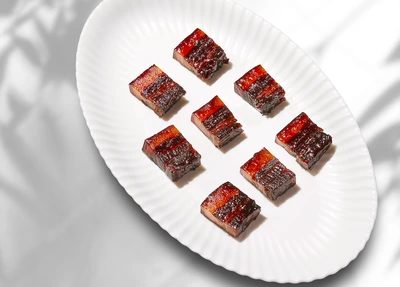
24. What’s the best way for a customer to describe your food?
I hope my food can reflect my passion for cooking, my commitment to quality ingredients, and my desire to create a memorable dining experience for every guest. If they describe my dishes with these terms, they capture the essence of what I strive to achieve.
24. 你认为顾客描述你的食物最佳方式是什么?
我希望我的食物能体现我对烹饪的热爱、对优质食材的坚持,以及为每位宾客创造难忘用餐体验的愿望。如果他们用这些词语来形容我的菜肴,那便捕捉到了我追求的核心精髓。
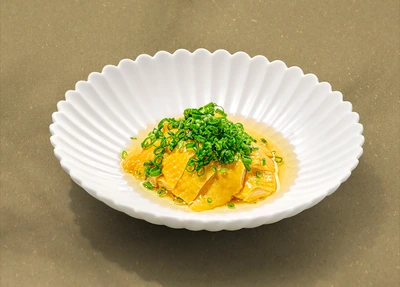
25. Are there any foods that are especially popular in your area that people might not know about outside of your region?
Bingfen is a widely loved street dessert in Chengdu. At Yun·Chinese Restaurant, we introduced the innovative “Red Sugar Rice Cake with Bird’s Nest Bingfen,” drawing inspiration from this local sweet treat.
25. 是否有一些食物在你所在地区特别受欢迎,但你所在地区以外的人可能不知道?
冰粉是成都街头广受欢迎的甜品。运·中餐厅我们推出了“红糖年糕配燕窝冰粉”这道创新菜肴便是以这道地方甜品创新而来。
26. Tell us about a successful dish or recipe you have created.
The signature dish at our Infinite Luck Chinese restaurant, “Strange Flavor Crispy Veal,” is a successful offering, launched in 2018 and widely acclaimed. It blends Sichuan’s “strange flavor” profile—featuring the fiery heat of chilies, the numbing tingle of Sichuan peppercorns, and the sweet-sour balance of sugar and vinegar. Using premium Australian Wagyu short ribs, seasoned with homemade sauce, it preserves tradition while innovating. Guests praise it as “authentic and surprising.”
26. 告诉我你创造过的一道成功的菜肴或食谱。
我们运·中餐厅招牌菜的“怪味酥小牛”是成都华尔道夫酒店的成功菜肴,2018年推出后广受欢迎。它融合四川“怪味”味型——辣椒的火辣、花椒的麻酥、糖醋的酸甜,七味平衡。选用的澳洲和牛牛小排,自制酱汁调味,保留传统又创新。宾客赞其“地道又惊喜”。
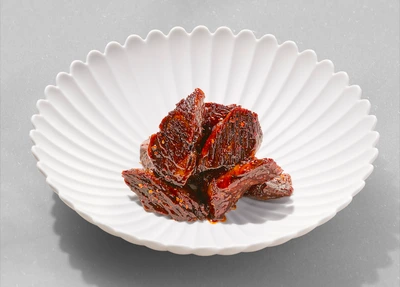
27. Can you recall a time you handled a situation with a disappointed customer?
Once, a guest found a dish too spicy, I adjusted the flavor and offered a dessert, ultimately earning their satisfaction.
27. 你如何处理特殊饮食(例如无麸质饮食)?
一次宾客觉得菜肴太辣,我重新调整口味并奉上甜点,最终赢得他们的满意。
28. Do you have any wine knowledge? Could you recommend wine pairings for the menu?
Yes, I would recommend Chardonnay to pair with spicy dishes, balancing the heat.
28. 你有葡萄酒知识吗? 能为菜单推荐葡萄酒搭配吗?
是的,我会推荐霞多丽配麻辣菜,平衡辣味。
29. What are your interests outside of work?
I’m a big fan of sports. I love playing badminton.
29. 工作之外你有什么兴趣?
我喜爱运动,羽毛球爱好者。
30. What advice would you give to youngsters joining the field?
Stay curious, respect ingredients and culture, and promote Sichuan culinary heritage.
30. 你对加入这个行业的年轻人有什么建议?
保持好奇心,尊重食材和文化,并发扬川菜文化。

+86 28 8888 1199
No. 1199 Tianfu Avenue North Chengdu, 610041 China
四川 成都 天府大道北1199號 610041